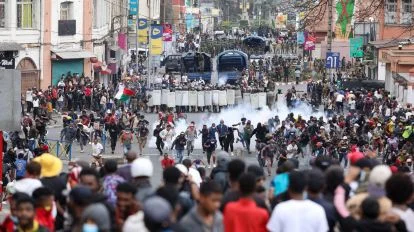On October 8, 2025, Madagascar’s youth protesters dismissed President Andry Rajoelina’s call for talks with students and leaders. They called it a “mockery” and accused the government of violent suppression.
Strike Looms After Ultimatum
The protesters, who set a 48-hour reform deadline, now plan a nationwide strike.
“We won’t negotiate with a repressive regime,” they posted online.
Thus, their movement, sparked September 25, demands Rajoelina’s resignation.
Doctors Join Madagascar Protests
Junior doctors supported the strike, denouncing police attacks on their Tuesday rallies. Initially fueled by water and power shortages, the protests now target poverty and alleged corruption.
Rajoelina’s Reforms Fail
Rajoelina sacked his cabinet and appointed a military prime minister. However, these moves failed to calm unrest, with streets still filled with demonstrators.
Rising Casualties
The UN reported 22 deaths and 100 injuries since protests began. This highlights the growing tension over service failures and governance issues.
Wider Demands Emerge
The Madagascar protests, starting with utility complaints, now seek systemic change. Protesters vow to continue until their leader steps down.
Uncertain Future
As the strike nears, Madagascar faces rising instability. The youth’s refusal to talk signals a tough road ahead for Rajoelina’s government.
READ ALSO: Nigeria Aims for Medals at 2025 Hockey Africa Cup




















